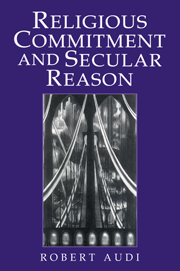Book contents
- Frontmatter
- Contents
- Preface
- PART ONE THE FOUNDATIONS OF DEMOCRACY AND THE SEPARATION OF CHURCH AND STATE
- PART TWO THE ETHICS OF CITIZENSHIP AND THE BALANCE OF RELIGIOUS AND POLITICAL ARGUMENTS
- PART THREE CIVIC VIRTUE AND POLITICAL ACTIVISM IN A RELIGIOUSLY PLURALISTIC DEMOCRACY
- Conclusion: Ethics, Religion, and Democracy
- Notes
- Index
Conclusion: Ethics, Religion, and Democracy
Published online by Cambridge University Press: 05 June 2012
- Frontmatter
- Contents
- Preface
- PART ONE THE FOUNDATIONS OF DEMOCRACY AND THE SEPARATION OF CHURCH AND STATE
- PART TWO THE ETHICS OF CITIZENSHIP AND THE BALANCE OF RELIGIOUS AND POLITICAL ARGUMENTS
- PART THREE CIVIC VIRTUE AND POLITICAL ACTIVISM IN A RELIGIOUSLY PLURALISTIC DEMOCRACY
- Conclusion: Ethics, Religion, and Democracy
- Notes
- Index
Summary
In concluding this book I want to start with a short redescription of its task. The overall problem it addresses is how, in a liberal democracy – a free and democratic society – a proper balance may be achieved between church and state and between religious and political considerations. The problem is particularly urgent today, and I hope that this book will help both individuals and institutions to arrive at sound and well-reasoned positions on how they should approach it. I have sought to speak not only to individuals whose interest in politics, religion, or philosophy is mainly intellectual, but also to conscientious activists; and not only to clergy and churches but to educators, journalists, legislators, judges, writers, and others who are in positions of authority or can influence some segment of the life of a free democracy.
Despite the diversity among major religious groups, they tend to share a wide range of specific concerns about the present direction of Western culture. Many believe, for instance, that there is too much violence and indiscriminate sex in the media, especially on television and the Internet; a pervasive self-centeredness that affects the tone of life and, in particular, conduct toward the poor and the unfortunate; a marginalization of religion, and, especially in the United States and other Western nations, of Christianity; an aggressively secular atmosphere in many educational institutions, private as well as public; and far too much permissiveness toward abortion and other forms of killing.
- Type
- Chapter
- Information
- Religious Commitment and Secular Reason , pp. 209 - 216Publisher: Cambridge University PressPrint publication year: 2000



